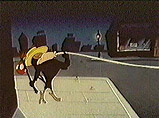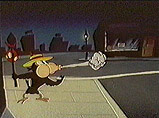Rooks in Exeter, England have discovered a unique health benefit to cigarettes that may just be enough to save the embattled industry. Commuters observed the rooks at St. David's train station fumigating their feathers with cigarette smoke. Swooping down to snatch up lit cigarette butts, the rooks would eventually drop the butt and tent their wings over it. It is believed that the birds did this to coax mites and other parasites out of their feathers. Jeff Jones, a passenger waiting on the platform described the behavior (with a charming British accent we're sure), "They were generally flapping about when a chap flicked a cigarette butt on to the track. One of the rooks swooped down and picked up the butt. It then flew around and landed on the platform, dancing around with this smoking cigarette in its beak. It looked quite comical. But then it dropped the butt on the platform and pulled its wings over it, collecting the smoke." Researchers believe that this astounding behavior confirms that British rooks are at least as intelligent as 1950's Era humans.
Rare footage of this complex behavior.

"The smooth, crisp taste of a Camel always satisfies a craving to rid my feathers of parasitic blood mites."
- Log in to post comments





